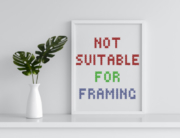The following is from one of our online coaching seminars in 2002.
Ministry in an Emerging Culture
Brian McLaren
I’m looking forward to this chance to interact with you through the EBA Community.
As for background reading, it makes the most sense to assume that any of my books would be good background:
• The Church on the Other Side (Zondervan) – Church ministry in the postmodern matrix
• Finding Faith (Zondervan) – Apologetics for postmodern folk
• A New Kind of Christian (Jossey-Bass/Leadership Network) – Grappling with Christian theology as it engages with the new culture
• More Ready Than You Realize (Zondervan) – Evangelism (as dance) in the emerging culture.
Any questions you’d like to ask about my writings … or how we’re seeking to live out our philosophy of ministry here at Cedar Ridge (where I serve as a pastor – www.crcc.org) … I’m game.
The following article can also serve as a conversation starter for us:
Why I Still Use The Word Postmodern:
Nearly everybody is sick of it. And no wonder, since it is used in a jillion different ways. Most commonly in standard conservative and liberal Christian circles, it is used to mean nihilistic, relativistic, anti-Christian, and otherwise slimy and bad. (As if the term “modern” were so much more hospitable to Christian faith!) Even among those who are more sophisticated in their understanding of the term, there is still a suspicion that if we aren’t careful, we’ll sell out and conform to whatever postmodern is, and thus prove unfaithful to the gospel. (As if we had the alternative of a culture-free version of the gospel, or as if we weren’t already sold out and conformed to modernity!)
After 9/11, it was fashionable to say, “See? People are waving flags again. Ha! Postmodernism is dead!” (As if there couldn’t be such a thing as postmodern patriotism! Or as if a major cultural shift never has countercurrents.) This was wishful thinking, I think, on the part of those who hoped that postmodernism would be a phase, and we’d get back to good old sensible modernity soon enough. (As if puberty were a phase, and kids would get over it and get back to being kids again.)
Some folks point out things that don’t appear to be changing, like the power of consumerism, and conclude that what we now have is not postmodernity, but rather hypermodernity. (As if there are no continuities between different eras.)
Some folks have started multiplying the “posts,” so we have post-postmodernism and post-post-postmodernism. (As if modernism itself could have been defined by, say, 1510, so that there was a new modernism by 1518, and another new one by 1570, and another by 1610 and 1650 and so on.)
OK. For all these reasons, I’m often sick of the term too, and I’m even more sick of all the stupid arguments about it, and I’m sicker still of post-post-posties. But I persist in using the term, not because of stubbornness, but because I think it’s the best term we have so far, and actually, I think the term is pretty helpful (as well as annoying).
Here’s how I see it. The medieval world (a period stretching, say, from the fall of Rome to the Protestant Reformation, very roughly from 500 to 1500 AD) wasn’t born in a day. It emerged over centuries. Medieval themes developed over a long period of time, and counter-themes too. No one single event (including the fall of Rome) launched the medieval era, and no one could say, “It began today.” Nevertheless, when a number of themes seemed to come together in the Mediterranean world, as they began to synergize and cohere, so that the era seemed to take on a certain ethos and trajectory and shape and life of its own … something real seemed to emerge gradually from the disintegrating ancient world: a culture dominated by the church, organizing around a developing feudal economy, seeing itself within the cosmic framework provided by Ptolemy, picking up the pieces after the fall of the old Roman Empire, coping with invading tribes from the north, East, and south, and surviving wave after wave of plagues.
Similarly, the modern world wasn’t born in a day. But there was another convergence of themes and technologies and deaths and beginnings – the printing press, the caravel, the rifle, the Copernican model of the universe, the challenge to the authority of the church, first by German political leaders and insolent priests. Interestingly, the term “modern” was first used in the 1490’s, and the previous era started being called the middle era about that time too. People seemed to feel that something was different.
In many ways, the modern era didn’t fully arrive until the Enlightenment in the mid-1600’s. It emerged gradually but surely over time, and continues growing and developing until today.
In some ways, we have three worlds coexisting on our planet today, even four. 1. There are still prehistoric pockets in a few rainforests (where it might become common to see naked tribesmen talking by cell phones or playing video games before they can read or write … or even before they have a written language!). 2. There are (or have been until very very recently) medieval warlords and feudal economies in places like Afghanistan. 3. There are, of course, huge modern economies and institutions and governments. 4. And … there are these signs of something beyond modernity too.
As I see it, new paradigms that emerge begin with a negative tone. People, just a few of them at first, become angry with the status quo. They protest, critique, complain about the current paradigm. Eventually, some of them must start trying to articulate something better, but the negative stage can go on for quite a while; in fact, it must, because it takes time to distance oneself enough from the dominant culture to even see any creative alternatives.
Those who speak of “post-postmodernism” are, I think, assuming that postmodern means only this early negative phase. I’d rather refer to this early negative phase of postmodern culture as … the early negative phase of postmodern culture. That will save having to add a lot of posts on as new phases come along.
By the way, I expect that some people in the early negative phase will paint themselves into a corner. They won’t be postmodern; they will be antimodern. They will paint themselves into a corner in one of two ways. First, they may advocate a return to some idyllic, pre-modern past which, of course, never really existed, and to which, of course, no one can ever really return. Second, they may become so against modernity that they refuse to use the lessons modernity (negative and positive) as accumulated capital. In other words, they will throw out the baby (all the valuable things that were gained during modernity) with the bathwater (all the negative things that were gained during modernity). Deprived of the baby, antimodern movements won’t get very far.
A lot of people seem to think that since modernity was rationalistic, postmodernity will have to be antirationalistic or irrational. No: that’s not postmodernity – it’s antimodernity. Postmodernity will more likely seek to integrate rationality with things beyond rationality, things like imagination, intuition, even faith. In fact, if the medieval era (the thesis, in a Hegelian progression) was seen as an era of faith, and the modern era (the antithesis, in the Hegelian sense) as an era of reason, we could expect the postmodern era to be a synthesis of faith and reason. (I think it was Jane Goodall who said, “If you think the Age of Reason was good, just wait until you see the Age of Love!”)
Again, a lot of people think that modernity was all about progress and optimism. Therefore, they surmise, postmodernity will be about despair and pessimism. Not quite. Early modernity was generally optimistic about human progress. But late modernity (after World War II) seemed to become cynical, jaded, disillusioned about progress. Postmodernity, I would expect, would seek to be both optimistic and pessimistic about progress. Again, one would expect a synthesis, not a rejection.
Also, people become confused when they think that a culture is monolithic, homogenous. That has never been true. Someone has defined a culture as a group of people who argue about the same things over generations. In other words, if a culture believes that the tension between the rights of the individual and good of the collective is an important issue, it will be characterized by heterogeneity (argument) on that issue. The fact that that issue is an unresolved issue helps define that culture; it’s the argument, the conversation, that creates the culture – not reaching an agreement about the issue. Similarly, the modern era was largely rationalistic, but it had a strong romantic strain protesting rationalism all through it. Thus modernity is best defined not by a monolithic opinion about reason, but rather by an ongoing argument about reason and its relationship to feeling, faith, etc.
The culture takes on a postmodern cast when we begin to assume that there is some sort of dynamic tension between reason and feeling, faith, etc., and we don’t expect one side to win over the other. The old reason-feeling argument doesn’t disappear, but it now becomes an accepted dynamic tension. In other words, nobody wins the argument; we just get tired of it and have already said all that we can think of to say about it, so we more or less accept it as an unresolved issue that we can live with, and our attention moves on to some new questions or problems … perhaps, as Jane Goodall suggested, in the direction of love: how do people of vastly differing belief systems get along on a small and increasingly interconnected planet?
Another reason for the widespread fatigue with the term postmodern: people like me too often indulge in facile dualisms. This is so modern; that is so postmodern, we say, with a kind of self-impressed arrogance. Not only is this kind of facile contrast annoying; it is also stupid. For example, I’ve heard people imply that planning is so modern and spontaneity (or bad planning!) is so postmodern. Wrong. Planning and spontaneity are both human. They always exist where humans exist. True, there is a kind of modern fascination with mechanistic control and technique that leads to a certain kind of favored modern planning. But postmodern people who tire of the mechanistic control and technique won’t be able to abandon all planning and live like amnesiacs, with no memory of past lessons learned the hard way … and therefore no ideas for better future attempts (i.e. plans). No … they will simply develop new kinds of planning (perhaps planning with planned-for margin for spontaneity!) that are less about mechanistic control and technique. So, modern planning is modern, but planning isn’t.
By the way, as soon as someone comes up with a better term than postmodern, or even a mildly promising candidate for a better term, let me know. What we call the automobile or car was known as a horseless carriage for a while, but not forever; I fully expect postmodern to be replaced someday just as horseless carriage was.
In the meantime, one of the reasons I haven’t abandoned the term is this: I think in longer time frames the older I get and the more I learn. So, I see the postmodern transition as a 75 or 150 year process. I don’t expect “postmodernity” to mature in my lifetime, so we might not figure out a more positive name for at least that long. I expect it will still be a fledgling, anonymous phenomenon when my kids retire. That long time frame used to bother me, but now I realize that each of us, like David, must simply serve God in our generation, and then die. And then others will take up the baton (if we have passed the baton reasonably well), and so on. We don’t need to be able to name our times in order to be faithful to God during them, although understanding them as well as we can seems like a better idea than not understanding them.
One other reason I haven’t given up on the term: I actually believe that people of faith like you and me can play a role in defining not just the term, but the era itself. In other words, I sense in this transition an openness – no, more: a desperate need – for people of faith to enter the fray and help create a new postmodern synthesis. Medieval faith without modern reason didn’t work. But modern reason without faith didn’t work either. Maybe there’s an untried alternative that we can help to pioneer? Maybe we have come to the kingdom for such a time as this? Maybe this opportunity is part of what keeps me hopeful about the times we are in, and that hopefulness keeps me using the term.
Anyway, if you don’t like what you hear about postmodernity, please don’t feel that I am forcing it on you. You might find this comforting: I fully expect, especially in the world of religion, that modernity will keep going strong for a few centuries. Let’s face it: there are still quite a few more or less medieval Roman Catholics out there, and quite a few more medieval Moslems. The world of religion has a fine way of baptizing the last era and riding it until the next era is nearly over. True, that kind of conservatism often gives religion a bad name, as if God isn’t quite strong or wise enough to deal with today.
Yet that conservatism, in some but not all sectors of the church, might not be an entirely bad thing in some ways. After all, many of us “postmoderns” are rediscovering good things from our medieval heritage, things that modernity forgot, and we’re glad for those who have maintained medieval values or practices through the harsh climate of modernity. I wouldn’t put it past God to keep some modern treasures alive in some enclaves of modernity – for the benefit of future generations (the real post-postmoderns, I mean).
Keeping that in mind may help protect us from a snobbery that we sense in some of our friends who are excited about postmodernity. (That’s not to say that postmoderns have a corner on the snobbery market. For example, have you noticed how many snobbish modern Calvinists there seem to be these days? Is that snobbery, or insecurity? I can’t tell.) Anyway, as I think more about it, I realize I’d rather be a humble modern than a snobbish postmodern any day.
But better still, I’d rather be a humble Christian seeking to do God’s will in our fast-changing world in harmony and collaboration with all God’s people (whatever their taste in eras). I hope you feel the same way, whether or not you use the term postmodern in the same way I do.





Add Comment